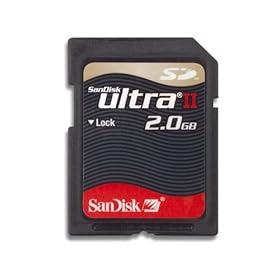James returned to the office clutching a SanDisk Ultra II 2.0GB SD card, and a box of 48 Toffee Crisp chocolate bars (Don't ask!) - and I thought wahey! This device looks like it's the 'High Performance' version of Sandisk's SD cards! A stroke of luck indeed, considering it was the only SD card CostCo had in stock...
So with SD card in hand I thought I might give Microsoft ReadyBoost a go. For those who are unfamiliar with the term, it's a relatively cheap way of speeding up your system by using SD cards or USB memory sticks to "add" to the system memory available in Windows Vista. Obviously it's not going to be faster than adding standard DDR2 memory but at 9MB/s write and 10MB/s read speeds (60x and 66x speeds respectively) I thought I might see some difference.
Some websites such as Anandtech have seen small differences in performance on their systems but here are my results when I timed Windows booting up. My specs are as follows:
- Asus R2H UMPC
- 900MHz Celeron Processor
- 768MB RAM
- 60GB Hard Drive
- Windows Vista Business Edition
Non-ReadyBoost Attempt 1: 1 minute 51 seconds
Non-ReadyBoost Attempt 2: 1 minute 48 seconds
ReadyBoost Attempt 1: 1 minute 52 seconds
ReadyBoost Attempt 2: 1 minute 57 seconds
Oh dear! My system has actually slowed down! Not quite the result I expected and suffice to say i'll be using the SD card for storage only in the future.
The Asus is not the kind of system that I would tend to heavily load (Such as using Photoshop with 22 photo's open at a time) or more than 4 Word documents open; so I chose not to run any kind of OS performance tests at this time. However in terms of perceivable difference in everyday operation/loading/closing of programs? None. Or negligable at best (Placebo effect?).
A shame really! I'll just have to hold out for that extra RAM now...

2 comments:
nike shoes
kyrie 4 shoes
supreme clothing
nike air max 97
nike huarache
air max
coach outlet online
nba jerseys
kd shoes
air yeezy
yeezy boost
retro jordans
ferragamo belt
jordan shoes
air yeezy
golden goose
jordan shoes
michael kors handbags outlet
hermes handbags bag
yeezy boost 350
Post a Comment